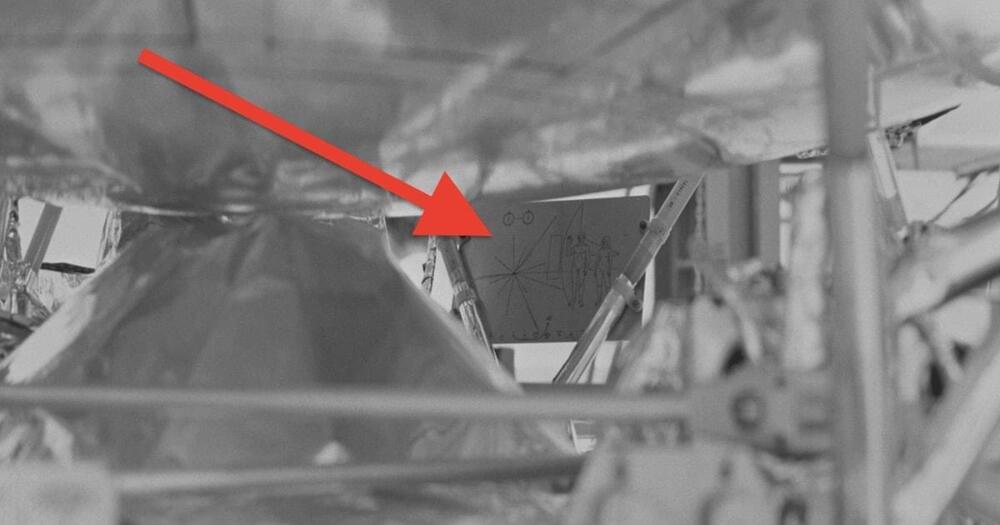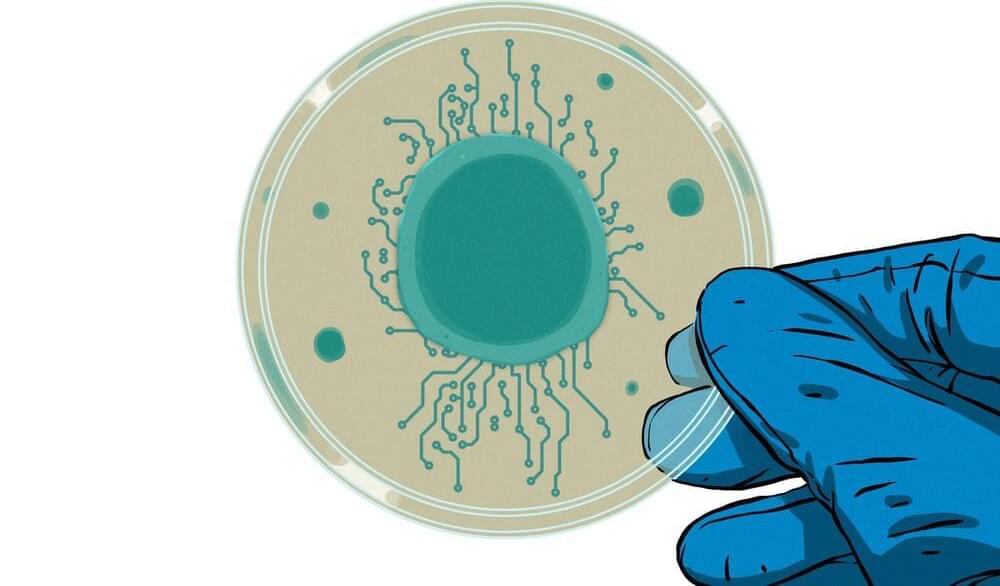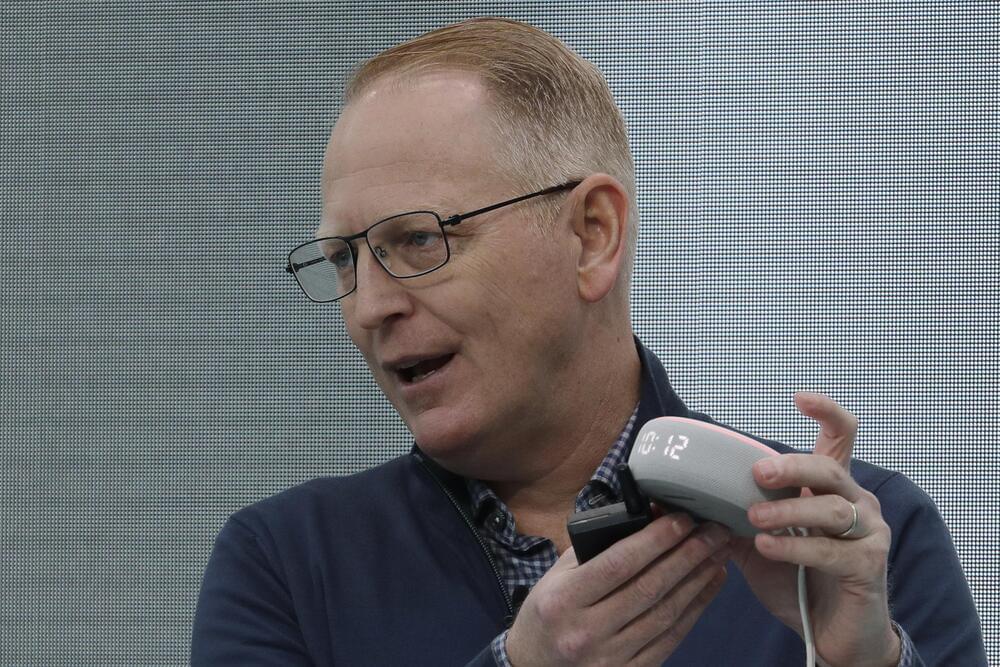Pioneer 10 was ahead of its time.
A mere fifty years ago, Pioneer 10 launched and became the first unmanned mission to Jupiter. The mission revealed new details about the Solar System — and sent a message to aliens.


Researchers with the University of Chicago Pritzker School of Molecular Engineering have shown for the first time how to design the basic elements needed for logic operations using a kind of material called a liquid crystal—paving the way for a completely novel way of performing computations.
The results, published Feb. 23 in Science Advances, are not likely to become transistors or computers right away, but the technique could point the way towards devices with new functions in sensing, computing and robotics.
“We showed you can create the elementary building blocks of a circuit—gates, amplifiers, and conductors—which means you should be able to assemble them into arrangements capable of performing more complex operations,” said Juan de Pablo, the Liew Family Professor in Molecular Engineering and senior scientist at Argonne National Laboratory, and the senior corresponding author on the paper. “It’s a really exciting step for the field of active materials.”
Autonomous drone mapping startup Emesent has announced its latest survey-grade LiDAR payload: Hovermap ST. The lightweight, IP65-rated solution is being launched with Emesent’s new Automated Ground Control feature that, the company stresses, enables autonomous data capture in harsher environments than ever and for a wider range of use cases.
Emesent’s LiDAR payloads leverage a process called simultaneous localization and mapping (SLAM), in which a drone builds a map and, at the same time, localizes the drone in that map.
The H+ Academy Roundtable presents “AGI: How it got started and key issues ahead” with Peter Voss and Ben Goertzel.

Neural networks have become a hot topic over the last decade, put to work on jobs from recognizing image content to generating text and even playing video games. However, these artificial neural networks are essentially just piles of maths inside a computer, and while they are capable of great things, the technology hasn’t yet shown the capability to produce genuine intelligence.
Cortical Labs, based down in Melbourne, Australia, has a different approach. Rather than rely solely on silicon, their work involves growing real biological neurons on electrode arrays, allowing them to be interfaced with digital systems. Their latest work has shown promise that these real biological neural networks can be made to learn, according to a pre-print paper that is yet to go through peer review.
The broad aim of the work is to harness biological neurons for their computational power, in an attempt to create “synthetic biological intelligence”. The general idea is that biological neurons have far more complexity and capability than any neural networks simulated in software. Thus, if one wishes to create a viable intelligence from scratch, it makes more sense to use biological neurons rather than messing about with human-created simulations of such.
There’s only one Universal Consciousness, we individualize our conscious awareness through the filter of our nervous system, our “local” mind, our very inner subjectivity, but consciousness itself, the Self in a greater sense, our “core” self is universal, and knowing it through experience has been called enlightenment, illumination, awakening, or transcendence, through the ages.
Here’s Consciousness: Evolution of the Mind (2021), Part IV: UNIVERSAL CONSCIOUSNESS
*Subscribe to our channel to catch premiering further installments of the documentary on YouTube! This film is to be released on YouTube in parts.
OR, watch the documentary in its entirety on Vimeo on demand: https://vimeo.com/ondemand/339083
And on TUBI — free (with ads): https://tubitv.com/movies/613341/consciousness-evolution-of-the-mind.
IMDb-accredited film, rated TV-PG Director: Alex Vikoulov Narrator: Forrest Hansen Copyright 2021 Ecstadelic Media Group, Burlingame, California, USA


If there is no doctor in the house, Amazon’s Alexa will soon be able to summon one.
Amazon and telemedicine provider Teladoc Health are starting a voice-activated virtual care program that lets customers get medical help without picking up their phones.
The service, for health issues that aren’t emergencies, will be available around the clock on Amazon’s Echo devices. Customers can tell the voice assistant Alexa that they want to talk to a doctor, and that will prompt a call back on the device from a Teladoc physician.

𝙈𝙖𝙘𝙝𝙞𝙣𝙚 𝙡𝙚𝙖𝙧𝙣𝙞𝙣𝙜 𝙖𝙡𝙜𝙤𝙧𝙞𝙩𝙝𝙢𝙨 𝙚𝙣𝙝𝙖𝙣𝙘𝙚𝙙 𝙢𝙚𝙙𝙞𝙘𝙖𝙡 𝙨𝙩𝙪𝙙𝙚𝙣𝙩𝙨’ 𝙩𝙚𝙘𝙝𝙣𝙞𝙘𝙖𝙡 𝙥𝙚𝙧𝙛𝙤𝙧𝙢𝙖𝙣𝙘𝙚 𝙖𝙣𝙙 𝙡𝙚𝙖𝙧𝙣𝙞𝙣𝙜 𝙤𝙪𝙩𝙘𝙤𝙢𝙚𝙨 𝙙𝙪𝙧𝙞𝙣𝙜 𝙖 𝙨𝙞𝙢𝙪𝙡𝙖𝙩𝙚𝙙 𝙗𝙧𝙖𝙞𝙣 𝙩𝙪𝙢𝙤𝙧 𝙨𝙪𝙧𝙜𝙚𝙧𝙮, 𝙖 𝙣𝙚𝙬 𝙨𝙩𝙪𝙙𝙮 𝙨𝙝𝙤𝙬𝙨.
𝙏𝙝𝙚 𝘾𝙊𝙑𝙄𝘿-19 𝙥𝙖𝙣𝙙𝙚𝙢𝙞𝙘 𝙝𝙖𝙨 𝙥𝙧𝙚𝙨𝙚𝙣𝙩𝙚𝙙 𝙗𝙤𝙩𝙝 𝙘𝙝𝙖𝙡𝙡𝙚𝙣𝙜𝙚𝙨 𝙖𝙣𝙙 𝙤𝙥𝙥𝙤𝙧𝙩𝙪𝙣𝙞𝙩𝙞𝙚𝙨 𝙛𝙤𝙧 𝙢𝙚𝙙𝙞𝙘𝙖𝙡 𝙩𝙧𝙖𝙞𝙣𝙞𝙣𝙜. 𝙍𝙚𝙢𝙤𝙩𝙚 𝙡𝙚𝙖𝙧𝙣𝙞𝙣𝙜 𝙩𝙚𝙘𝙝𝙣𝙤𝙡𝙤𝙜𝙮 𝙝𝙖𝙨 𝙗𝙚𝙘𝙤𝙢𝙚 𝙞𝙣𝙘𝙧𝙚𝙖𝙨𝙞𝙣𝙜𝙡𝙮 𝙞𝙢𝙥𝙤𝙧𝙩𝙖𝙣𝙩 𝙞𝙣 𝙨𝙚𝙫𝙚𝙧𝙖𝙡 𝙛𝙞𝙚𝙡𝙙𝙨.
𝙏𝙝𝙚 𝙣𝙚𝙬 𝙨𝙩𝙪𝙙𝙮 𝙛𝙞𝙣𝙙𝙨 𝙩𝙝𝙖𝙩 𝙞𝙣 𝙖 𝙧𝙚𝙢𝙤𝙩𝙚 𝙚𝙣𝙫𝙞𝙧𝙤𝙣𝙢𝙚𝙣𝙩, 𝙖𝙣 𝙖𝙧𝙩𝙞𝙛𝙞𝙘𝙞𝙖𝙡 𝙞𝙣𝙩𝙚𝙡𝙡𝙞𝙜𝙚𝙣𝙘𝙚 (𝘼𝙄) 𝙩𝙪𝙩𝙤𝙧𝙞… See more.
The Neuro-Network.
𝐀𝐈 𝐓𝐞𝐚𝐜𝐡𝐞𝐬 𝐁𝐫𝐚𝐢𝐧 𝐓𝐮𝐦𝐨𝐫 𝐒𝐮𝐫𝐠𝐞𝐫𝐲 𝐁𝐞𝐭𝐭𝐞𝐫 𝐓𝐡𝐚𝐧 𝐇𝐮𝐦𝐚𝐧 𝐄𝐱𝐩𝐞𝐫𝐭𝐬
Artificial intelligence tutors are outperforming human instructors.
Interfacing technology and electronics with the real world is often fairly tricky. Complexity and edge cases work their way in to every corner of a project like this; just ask anyone who has ever tried to operate a rover on Mars, make a hydroponics garden, or build almost any robotics project. Even those of us who simply own a consumer-grade printer are flummoxed by the ways in which they can fail when manipulating single sheets of paper. This robotic lawnmower is no exception, driving its creator [TK] to extremes to get it to mow his lawn.
[TK] actually had a platform for his autonomous mower ready to go thanks to a previous build using this solar-powered robot to explore the Australian outback. Adding another motor to handle the grass trimming seemed simple at first and he set about wiring it all up and interfacing it to the robot. After the first iteration he found the robot was moving too fast to effectively cut the grass, so he added a more powerful cutting motor and a gearbox to help the mower crawl more slowly over the lawn. Disaster struck when his 3D printed mount for the steel cutting blades shattered, but with [TK] uninjured he pushed on with more improvements.
As it stands right now, the mower can effectively cut the grass moving forward even with the plastic-only cutting blades that [TK] is using now for safety reasons. The mower stripped its reverse gear so there still are some improvements to make before this robot is autonomously cutting the lawn without supervision. Normally we see lawnmowers retrofitted with robotics rather than robotics retrofitted with a lawnmower, but we’re excited to see any approach that lets us worry about one less household chore.